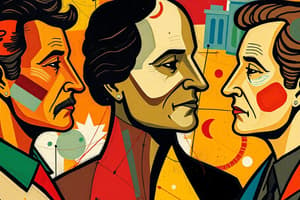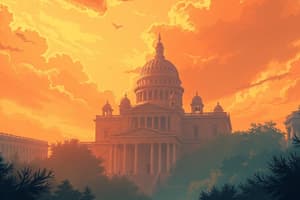Podcast
Questions and Answers
What is the primary focus of Political Theory within political science?
What is the primary focus of Political Theory within political science?
- Examination of political systems
- Ideas and philosophies about politics (correct)
- Analysis of government policies
- Interstate interactions and relations
Which of the following defines the term 'Sovereignty'?
Which of the following defines the term 'Sovereignty'?
- Acceptance of an authority by the public
- The ability to enforce laws
- Legitimate power recognized by society
- Authority of a state to govern itself (correct)
What distinguishes Democracy from Authoritarianism?
What distinguishes Democracy from Authoritarianism?
- Elected representatives making decisions (correct)
- Direct voting by citizens on all issues (correct)
- The concentration of power in a single authority
- Limited political freedom for citizens
Which electoral system requires a candidate to receive more than half of the votes to win?
Which electoral system requires a candidate to receive more than half of the votes to win?
In the context of international relations theories, what does Realism emphasize?
In the context of international relations theories, what does Realism emphasize?
What is a key characteristic of Totalitarianism?
What is a key characteristic of Totalitarianism?
What aspect of Public Opinion is critical in shaping political behavior?
What aspect of Public Opinion is critical in shaping political behavior?
Which of the following best describes Comparative Politics?
Which of the following best describes Comparative Politics?
Flashcards are hidden until you start studying
Study Notes
Overview of Political Science
- Definition: The study of political systems, behavior, and activities.
- Subfields:
- Comparative Politics: Examines different political systems.
- International Relations: Studies interactions between countries.
- Political Theory: Focuses on ideas and philosophies about politics.
- Public Administration: Explores the implementation of government policy.
- Public Policy: Analyzes creation and effects of laws and regulations.
Key Concepts
- Power: Ability to influence or control behavior of people and outcomes.
- Authority: Legitimate power recognized by society.
- Legitimacy: The acceptance of an authority, often a governing law or regime.
- Sovereignty: The authority of a state to govern itself.
- State vs. Government: The state is a political entity, while government is the mechanism through which the state operates.
Political Systems
- Democracy:
- Direct: Citizens vote on all issues directly.
- Representative: Citizens elect representatives to make decisions.
- Authoritarianism: Concentration of power in a single authority, limited political freedom.
- Totalitarianism: Centralized control extending to all aspects of life.
- Monarchy: Rule by a single person, often hereditary.
Political Behavior
- Public Opinion: Collective preferences of the public on political issues.
- Political Socialization: Process by which individuals acquire political beliefs and values.
- Political Participation: Involvement in political activities, such as voting and protests.
Electoral Systems
- Plurality Voting: Candidate with most votes wins.
- Majority Voting: Candidate must receive more than half the votes.
- Proportional Representation: Parties gain seats in proportion to votes received.
International Relations Theories
- Realism: Focus on state power and national interest.
- Liberalism: Emphasizes cooperation and international institutions.
- Constructivism: Highlights the role of ideas, beliefs, and identities.
Key Institutions
- Legislatures: Bodies that make laws.
- Executives: Individuals or groups that enforce laws.
- Judiciaries: Courts that interpret laws and adjudicate disputes.
Globalization
- Impact on Politics: Increased interconnectedness affects state sovereignty and policy-making.
- Transnational Issues: Challenges like climate change and terrorism that transcend national borders.
Political Economy
- Definition: Study of the relationship between politics and economics.
- Key Concepts:
- Economic Systems: Capitalism, Socialism, Mixed Economies.
- Influence of economic interests on legislation and policy.
Important Theorists
- Niccolò Machiavelli: Emphasized statecraft and power.
- John Locke: Advocated for natural rights and social contract.
- Karl Marx: Critiqued capitalism and proposed class struggle.
Contemporary Issues
- Populism: Political approach emphasizing the needs of ordinary people.
- Political Polarization: Increasing division between political parties and ideologies.
- Human Rights: Focus on the protection and promotion of individual rights globally.
Overview of Political Science
- Political science is the study of how power is exercised.
- Its subfields include comparative politics, international relations, political theory, public administration, and public policy.
Key Concepts
- Power is the ability to influence or control people and outcomes.
- Authority is legitimate power recognized by society.
- Legitimacy is acceptance of that authority.
- Sovereignty is the authority of a state to govern itself.
- The state is a political entity, while the government is the mechanism through which the state operates.
Political Systems
- Democracy is a political system where citizens hold power.
- Direct democracy means that citizens directly vote on all issues.
- Representative democracy means that citizens elect representatives to make decisions for them.
- Authoritarianism is a political system where power is concentrated in a single authority, often with limited political freedom.
- Totalitarianism is a centralized political system that controls all aspects of life.
- A monarchy is a political system in which a single person rules, often through hereditary succession.
Political Behavior
- Public opinion reflects the collective preferences of the public on political issues.
- Political socialization describes how individuals acquire their political beliefs and values.
- Political participation involves engagement in political activities, like voting and protests.
Electoral Systems
- Plurality voting is where the candidate with the most votes wins.
- Majority voting requires a candidate to receive more than half the available votes.
- Proportional representation allocates seats based on the percentage of votes each party receives.
International Relations Theories
- Realism emphasizes state power and national interest in international relations.
- Liberalism promotes cooperation and international institutions to drive global governance.
- Constructivism emphasizes the role of ideas, beliefs, and identities in shaping international relations.
Key Institutions
- Legislatures are bodies that make laws.
- Executives are individuals or groups that enforce the laws.
- Judiciaries are courts that interpret the laws and adjudicate disputes.
Globalization
- Globalization has interconnectedness and affects state sovereignty and policy-making.
- Transnational issues, like climate change and terrorism, transcend national borders.
Political Economy
- Political economy studies the relationship between politics and economics.
- It examines the impact of economic forces on legislation and policy, while also considering the impact of political interests on economic systems, such as capitalism, socialism, and mixed economies.
Important Theorists
- Niccolò Machiavelli emphasized statecraft and power.
- John Locke advocated for natural rights and social contracts.
- Karl Marx critiqued capitalism and proposed class struggle.
Contemporary Issues
- Populism is a political approach that emphasizes the needs of ordinary people.
- Political polarization is the growing division between political parties and ideologies.
- Human rights are concerned with the protection and promotion of individual rights.
Studying That Suits You
Use AI to generate personalized quizzes and flashcards to suit your learning preferences.




